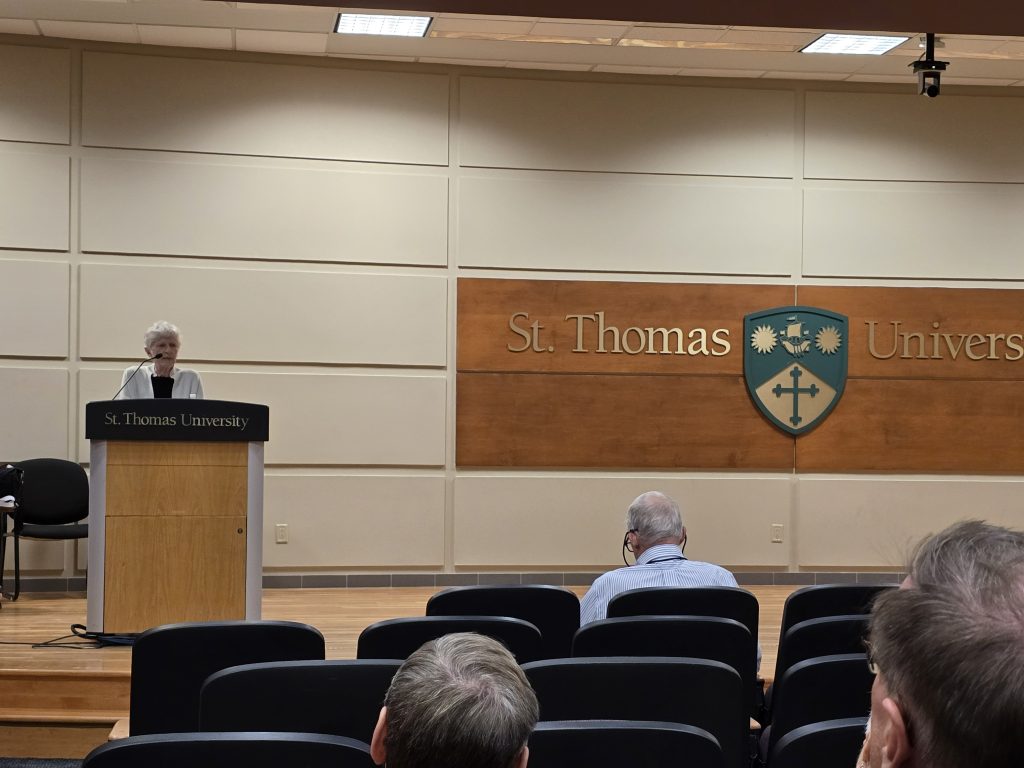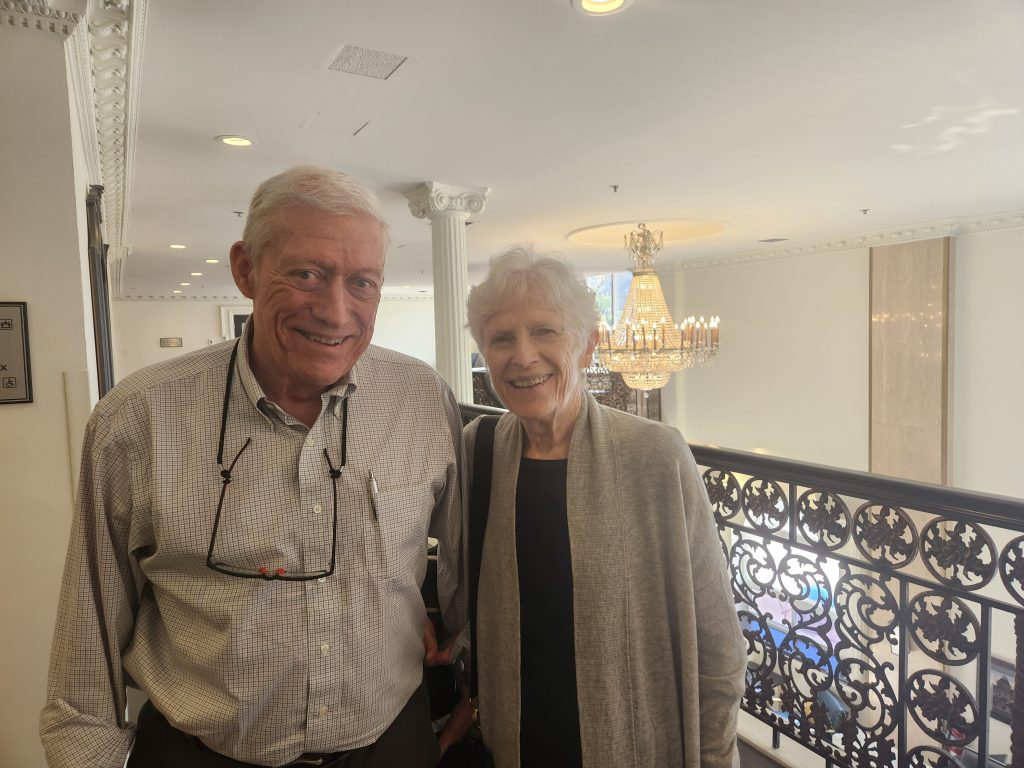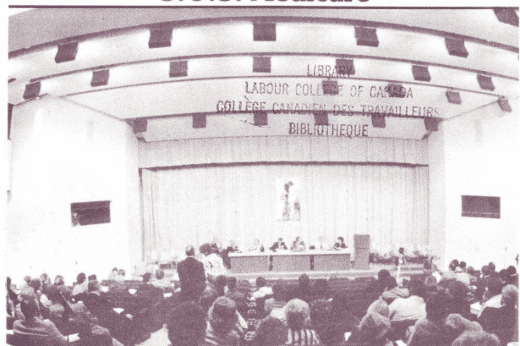Finding the joy in long-term care with Pat Armstrong
A personal support worker lost so many residents in her long-term care home during the onset of COVID-19 that she can no longer tolerate the sound of the zipper on her winter coat. It reminds her too much of the sound of the zippers closing the body bags that carried away the people she cared for.
A Fredericton audience gasped when Pat Armstrong told the story during her lecture on joy in long-term care last week. Care workers are used to losing people but not so many all at once as they did during the pandemic.
The distinguished researcher coined the phrase, “the conditions of care are the conditions of work,” now a slogan of nurses and other health care workers, and even repeated by Prime Minister Justin Trudeau.
Armstrong captivated an audience of students, professors, health care workers and administrators with her talk on finding the joy in nursing homes as part of the Dr. T. LeRoy Creamer Memorial Lecture at St. Thomas University on October 3. The talk was organized by St. Thomas University’s Gerontology Department including Armstrong’s colleague and former student, Albert Banerjee, a critical gerontologist and the Health Research Chair in Community Health and Aging.

Canada’s foremost sociologist of health challenged the audience to think about how to “put life into years and not years into life.”
Armstrong identified three sources of joy to be found in long-term care.
The first involves relationships. Armstrong described the importance of meaningful relationships that can develop between care workers, residents, families and volunteers. For Armstrong that requires time and continuity of care, but short staffing means the bare minimum is done to keep residents alive instead of paying attention to making life worth living on a daily basis.
Exercising skills and building capacities of everyone in a care home, the care workers and the residents, is the second place to find joy, according to Armstrong.
“We must trust the people who provide care more in terms of them deciding what needs to be done for and with a resident, based on what they know about the resident, but that also means there needs to be continuity of care so they know the residents,” Armstrong told CBC Info Morning Fredericton listeners earlier in the week.
“We too often assume that residents can’t do something… In Norway, when we studied long-term care homes there, we saw a choir that was made up of primarily people with dementia, who were non-verbal on a daily basis, and that choir even performed for others. We need to think about the skills that residents have and build on their capacities,” added Armstrong.
At the lecture, Armstrong told the story of a chef who found joy in preparing meals in ways that ensured residents got the nutrients they needed. Residents were feeling overwhelmed by the large portions of food being served to them and were not eating their food, so the chef figured out how to serve the meals in portions that were appealing to the residents.
Choice is the third way to see joy in long-term care, according to Armstrong. Choices over food, clothes, entertainment and privacy, and even death make a difference in residents’ lives.
Armstrong challenged the notion that everyone wants to age in their homes. Home is not a safe space for everyone, and homes can also be lonely. Long-term care residences can be places where people find community and don’t feel like a burden to their family members.
One personal support worker who identified as being a CUPE member affirmed what Armstrong said about the staffing levels in care work, highlighting the moral injury that comes with the work. “We fight for our residents,” she said. She blamed Premier Blaine Higgs for the crisis in long-term care, drawing applause from the audience.
In response to New Brunswick Auditor General Paul Martin’s report released in June that criticized the Higgs government’s spending on for-profit staffing agencies to the tune of $175 million, CUPE 1252, the New Brunswick Council of Hospital Unions, representing more than 9,000 health care workers, said that money should have been invested instead “in our hardworking in-house health care workers.”
The union has noted that public sector personal support workers working in care made $23/hour while those contracted out made up to $162/hour. The union added, “And it gets worse. No receipts required for expenses like flights, meals, and hotels. Contracts written entirely by staffing companies with no oversight. No legal review of any contracts. Companies billing for 12-hour shifts when working as few as 3.5 hours.”
“While our government nickel-and-dimes public sector workers, it’s rolling out the red carpet for corporate predators. Enough is enough! It’s time to put an end to this corporate welfare and invest in our public health care workforce,” stated CUPE 1252.
New Brunswick’s health care election
Armstrong’s lecture was timely with an election in New Brunswick happening on October 21. Health care is a top election issue.
Progressive Conservative Party Leader Blaine Higgs told an audience at an event organized by the Fredericton Chamber of Commerce at the University of New Brunswick on October 7 that he will improve health care through a “business acumen,” if he is re-elected to a third term as premier.
With health care privatization in New Brunswick being described as being in a full gallop, Susan Holt, the Liberal Party Leader, told the NB Media Co-op in March that her party would not further privatize health care and would revisit the contracts with Medavie Blue Cross for health care services. This marks a shift from the last Liberal government in New Brunswick that contracted out extramural and Tele-Care services to Medavie Blue Cross.
The Greens’ David Coon said they would treat access to primary care as a right, eliminate waiting periods, make multi-million dollar investments and convert doctor’s practices into collaborative team-based family practices.
The NDP pledged to launch 40 community health clinics, join the federal pharmacare initiative, work towards universal pharmacare by removing premiums from the current NB Drug Plan while increasing enrollment, and expand Medicare to cover mental health therapy.
In an interview with the NB Media Co-op, Armstrong was joined by her partner and colleague Hugh Armstrong, a professor emeritus of social work at Carleton University and a board member of the Ontario Health Coalition. He argued that profitization is a better term to describe the problems in health care, noting that not-for-profits often hire for-profits to manage them, are governed by corporate representatives and are run on business models.

Pat Armstrong argued that more money is needed in health care, “but it’s not just about the money.” Armstrong wants to see strategies to retain health care workers, namely improvements to their conditions of work. The Canadian Health Coalition board member also said services need to be kept in the public system and profit needs to be removed from care.
A student taking sociology of health at St. Thomas University remarked that they didn’t expect to be hopeful coming out of a lecture about long-term care, but they were.
An audience member asked Armstrong, “Where does Pat Armstrong find joy?” Without skipping a beat, she said, “Figuring this stuff out.”



